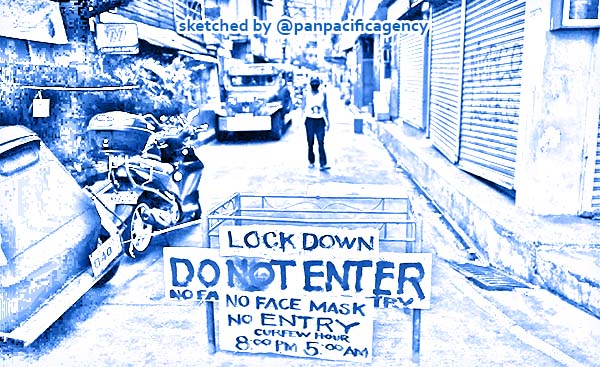Philippine economic growth outlook trimmed due the impact of the Luzon-wide lockdown: Bank

A makeshift lockdown's barricade blocks a street from outsiders to protect a neighbourhood from the spread of coronavirus disease (COVID-19) in Manila, Philippines, March 23, 2020. REUTERS/Eloisa. Sketched by the Pan Pacific Agency.
MANILA, Apr 30, 2020, The Manila Times. The Rizal Commercial Banking Corp. (RCBC) further trimmed its growth estimate for the Philippine economy this year to between -1.5 and 0.5 percent after taking into account the impact of the Luzon-wide enhanced community quarantine (ECQ) on the country’s economic activities, The Manila Times reported.
The forecast is a downgrade from the Yuchengco-led lender’s previous gross domestic product (GDP) growth outlook of -1 to 1 percent. If correct, the estimate would settle below the government’s revised growth assumption of -0.8 to zero percent for 2020 and the 5.9-percent GDP expansion in 2019.
It is also lower than S&P Global Ratings’ -0.2 percent, Fitch Solutions’ 4.0 percent, the World Bank’s 3 percent, Moody’s Investors Services’ 2.5 percent, the Asian Development Bank’s 2 percent, Nomura’s 1.6 percent, ANZ Research’s 1.2 percent, and the International Monetary Fund’s 0.6 percent; but higher than ING Bank Manila’s -2.2 percent.
In a report on Tuesday night, RCBC economist Michael Ricafort said the bank’s latest projection was “a result of sharply reduced business and economic activities during the two-month ECQ period.”
On March 16, the government placed Luzon under ECQ to contain the spread of coronavirus disease 2019 (Covid-19) pandemic in the country. Originally set to be lifted on April 12, the government later extended it to April 30. Last Friday, the government again extended the lockdown in Metro Manila and other provinces until May 15.
First surfacing in the city of Wuhan in China’s Hubei province in December, the highly contagious respiratory disease has spread to 213 countries and territories, infecting nearly 2.96 million people, of which 202,733 died, according to the latest World Health Organization data.
In the Philippines, the number of confirmed Covid-19 cases stands at 8,212 as of Wednesday. Of this, 1,023 recovered and 558 succumbed to the illness.
According to Ricafort, the ongoing ECQ is equivalent to about 16 percent of yearly output losses for the hardest-hit sectors.
“Since Luzon accounts for at least two-thirds of the country’s economy, the two-month lockdown could potentially erase [or] wipe out about 5 [to] 6 percent of the country’s GDP growth (or equivalent to at least P1 trillion) for 2020 on a more realistic scenario,” he said.
The RCBC economist added that another major drag on GDP growth is the fact that many workers and other people from both the formal and informal economy lost their livelihoods.
“With many people staying or working from home, while many businesses, such as those involving discretionary products, remained…closed, this will reduce consumer spending, which accounts for about 70 percent of the economy,” Ricaford explained.
He stressed, however, that the government’s P1.49-trillion four-pillar response to the pandemic would help partly make up for the economic losses.
“Any economic losses [or] fallout due to [the] Covid-19 lockdown could also be offset by the government’s fiscal stimulus [and] monetary policy easing measures, and other interventions to somewhat partly mitigate the economic losses [or] fallout, as well as prevent [or] avert the risks of recession due to Covid-19, lurking locally and in many other countries worldwide,” Ricafort said.